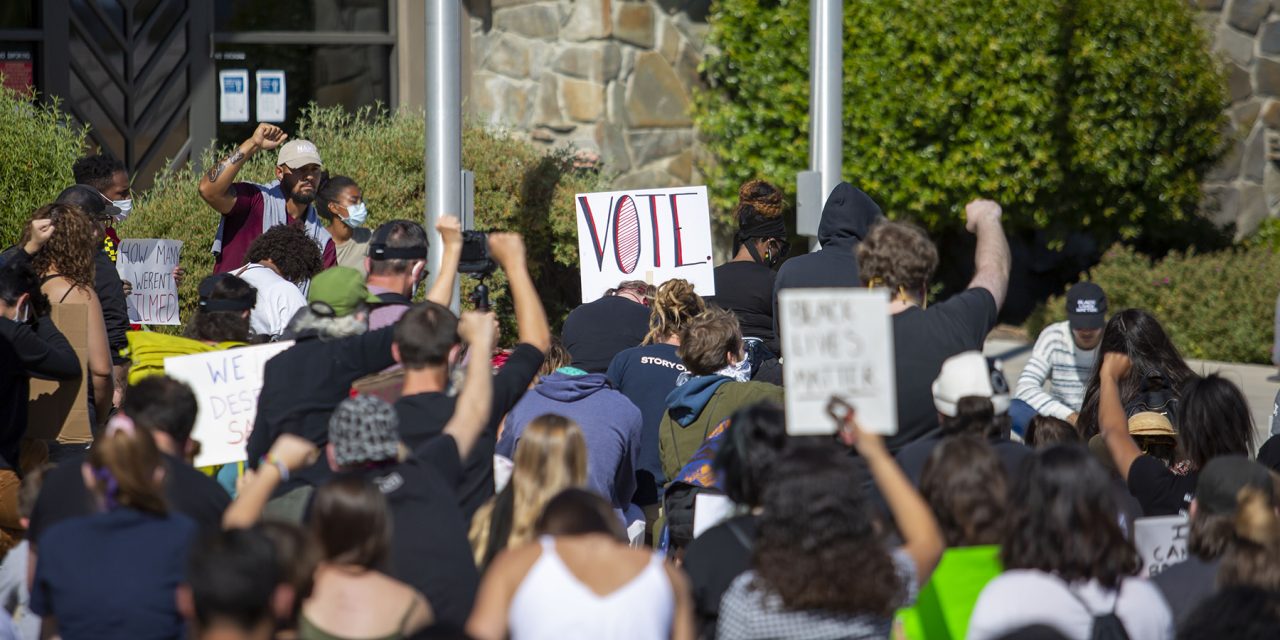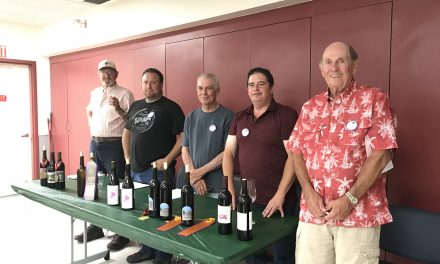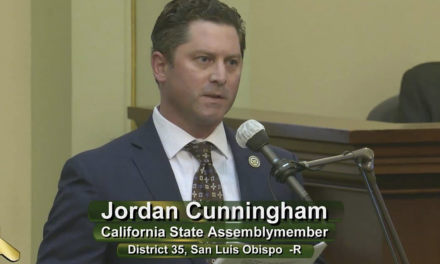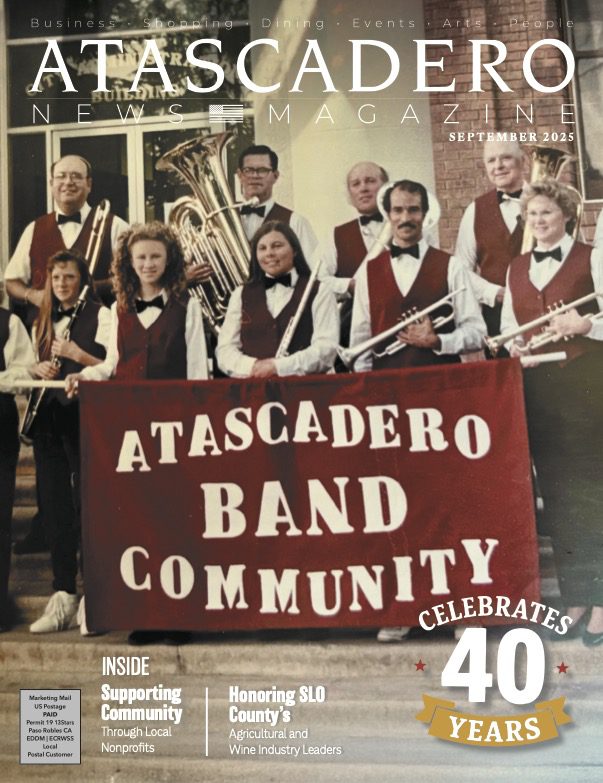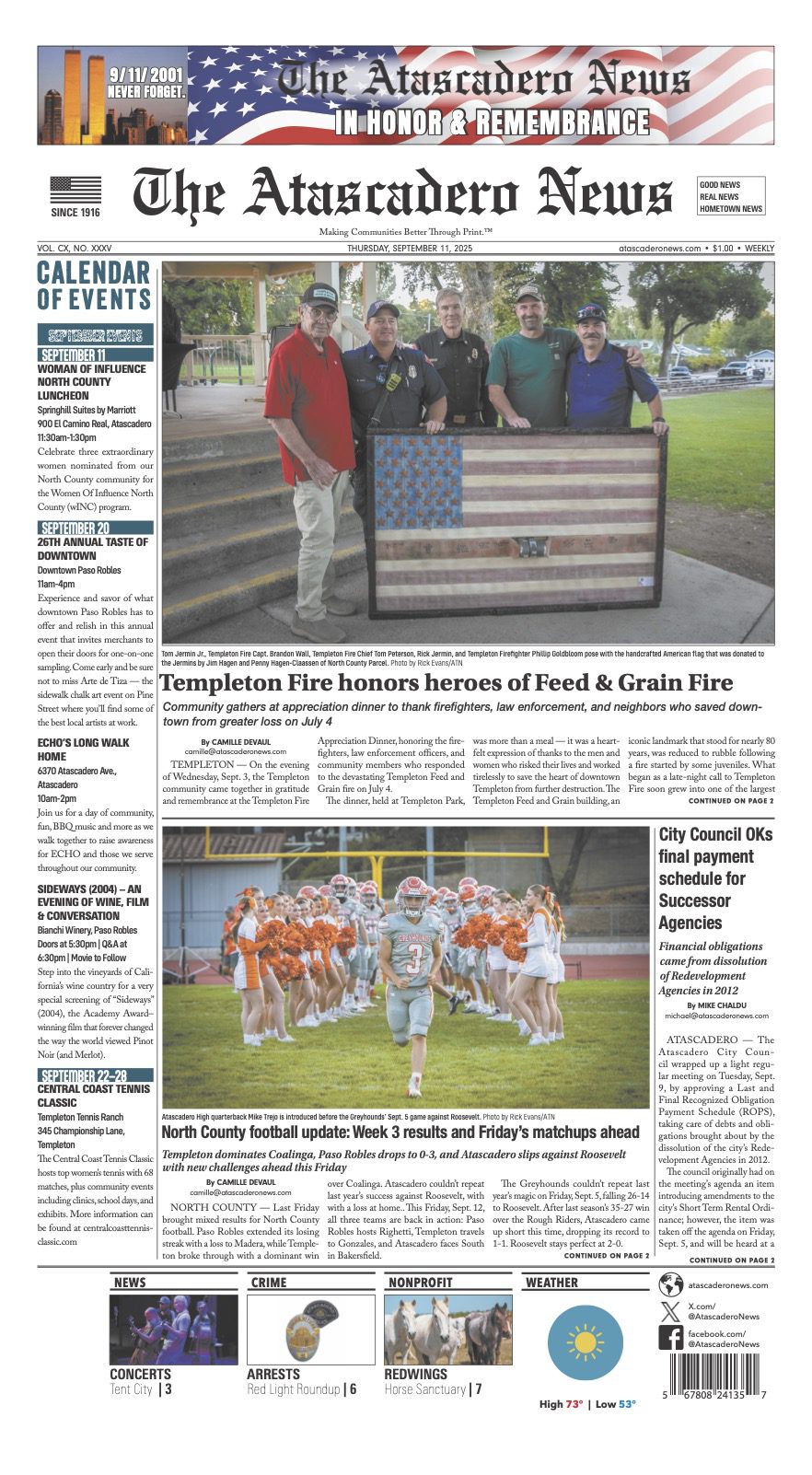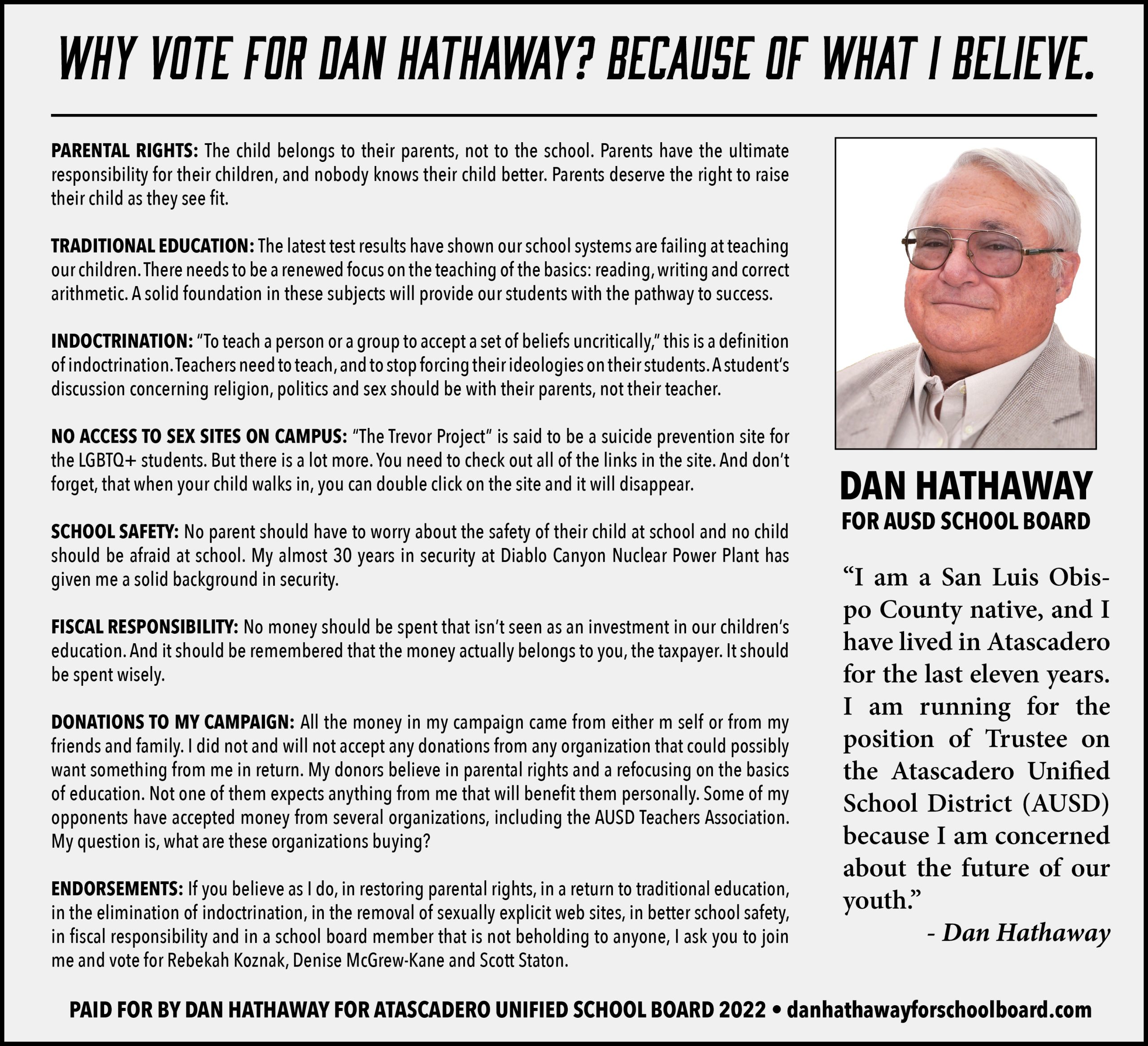In the aftermath of national grief and anger over police violence, local protests call for change
On Sunday, members of the San Luis Obispo County chapter of the NAACP attended a protest in Atascadero with hundreds of people marching from Sunken Gardens to the Atascadero Police Department and back.
The protest was organized by Hannah Gonzales, M’Lynn Martin, and Marc Martin. Very quickly, the protest gained traction on social media and hundreds turned out on Sunday for the event.
Before heading on a march from the park to the police department, the NAACP presented a short speech with a the list of demands for change they had. Members of the Atascadero City Council — mayor Heather Moreno, council member Susan Funk, and council member Charles Bourbeau — as well as executives of the City of Atascadero — city manager Rachelle Rickard and police chief Jerel Haley — were in attendance to hear out the crowd.
Haley approached Mr. Martin and invited him for a one-on-one discussion about ideas for changes to the APD that would improve the service of local police to all residents of the community.









During the stop at the Atascadero Police Department, the crowd kneeled in a moment of silence for 8 minutes and 46 seconds in honor of George Floyd who was killed by Minneapolis police officer Derek Chauvin in broad daylight on March 25. The quiet crowd rose to its feet with a tangible unified strength before moving back to the Sunken Gardens.












At Sunken Gardens, SLO County NAACP president Stephen Vines spoke to the crowd passionately about making a difference and making change in the community. He spoke on the subject of violence, policy, social justice and making change.
“Violence is the enemy of all of us,” Vines said. “It will kill, and steal, and destroy. Violence only begets violence.”
Formed in 1909 by a diverse group of activists, the NAACP, or the National Association for the Advancement of Colored People, is the oldest and largest civil rights organization. The SLO County branch is one of more than 2,200 nationwide. Among other things, the NAACP charter promises to champion equal rights and eliminate racial prejudice. Vines let the crowd know, the NAACP has the credentials to back up change.
“Here at the NAACP — the oldest, the boldest, the toughest, the roughest — we are nonviolent, and we are changing the world,” Vines proclaimed over the loudspeaker. “We don’t need no bad language. We don’t need none of that. We have the truth on our side, and the truth is that love always heals.
“Peace is what we are after, and we aren’t going to let anybody steal it from us. We got to keep our eye on the ball. We are about social justice, because there ain’t no peace without justice.”




“So where do we go from here?” Vines continued. “We have to deal with policy. In order to deal with policy, we have to have political power. What is political power? Political power is having enough votes to win. Not just vote, but to win.”
Vines implored the crowd to get out the vote, strategize, and register people to vote.
“This older generation hasn’t been too nice to you all,” Vines said. “You need to take the matter over, and straighten this garbage out. If you all don’t do it, it isn’t going to get done. Us old people have been conditioned to go with the okie doke [expletive].”
He finished with a challenge to members of the crowd to commit to change by running for local public office as leaders of the community.
“Which one of you is going to run for mayor?” Vines asked. “Which one of you is going to run for county supervisor? Which one of you is going to run for city council? That is what you all need to do, because we need to shake it up, and power to the people.”
Vines rallied the passionate and peaceful crowd, encouraging a move to action and voting in the November 2020 election before peacefully ending the assembly with a prayer led by Atascadero native Jerry Gaona.
“It’s pretty amazing to see so many people come out,” Gaona said. “A lot of people were afraid to come out just because they didn’t, and I didn’t, want to be a part of group that was disrespectful to the police or businesses. But what I did want to do, is [represent] the 2 percent African American in SLO County.”
Gaona grew up in Atascadero, and his personal experience as a boy moved him to want to participate in positive change.
Gaona’s grandfather was David Cowan, who moved to Atascadero in 1913 and is credited for naming the annual parade “Colony Days.”
“I have a long history of racism in Atascadero with me and my family,” Gaona said, “and what me and my brothers experienced. It was mostly great, but we have some specific things that happened to us that have been scars.”
Gaona said his boys, aged 9, 11, and 13, experienced racism since moving back to Atascadero from the Burbank area six years ago.
“I didn’t even talk to my kids about racism until we moved back to Atascadero,” Gaona said. “My kids have been called the ‘N’ word several times at school, and there have been so many other instances.”
While positive and negative aspects of small town add to complications and difficulties for young kids growing up, Gaona affirmed that positive changes are happening.
“I wanted to be here because so many people commenting on the protests make it out to be a negative thing,” Gaona said, “but I see both sides. I see the Black-on-Black crime, I see all the statistics — I see both sides, and I love both sides of the story.”
The current chapter of the national story is complete with violence, looting, rioting, burning, confrontation, aggravation, and calls for anarchy as well as prayers, dialogue, peaceful protests, and calls for unity. Gaona said he believed local change was possible through open and honest dialogue.
“I understand the history, and there is still racial issues in Atascadero,” Gaona said. “I wanted to be here to peacefully protest, but also to start a dialogue with everyone. A lot of it has to do with the fact that there is a small population of African Americans in the community, and we want to be a part of the conversation and bring unity to Atascadero.”
As national debate roils in the short months prior to a presidential election, the two dominant parties in the United States move to make the case for their candidates and 2020 has so far provided source material like few moments in modern history. Meanwhile, local communities face local issues that call for local leadership and local solutions that may not necessarily demand political support or allegiance.
“I don’t stand with any one organization,” Gaona said. “I don’t believe in everything everyone else believes in, but I do believe in love and I believe in trying to have a conversation and peacefully protest and talk about real issues.”
Gaona’s experience with local police bears out a somewhat typical story for an Atascadero resident, which included some positive experiences and some room for improvement. On Sunday, the Atascadero police were joined by SLO County Sheriff deputies and Morro Bay Police officers to stand watch for the health and safety of citizens and local businesses as protests work to shake the stigma carried from previous weeks of violence and vandalism. Due to the rumors and fear surrounding a Tuesday protest in Paso Robles, multiple businesses boarded up their doors and windows in defense, and that defense stood through Sunday.
During Sunday’s protest, the crowd moved without qualm through the downtown, as police managed traffic.
“I had a conversation with police and I thanked them,” Gaona said. “Every police I walked by, I thanked them for being there and for protecting us, because there are a lot of great things the police are doing, but there is a conversation to be had about things my family has experienced with the police. It has been 95 percent great, but there is that 5 percent that I think we need to have that conversation.”
Vines expressed that Sunday’s assembly was a part of a series of assemblies that will occur throughout SLO County through the months leading to the election in November.
Organizers led an 8:46 second moment of silence in the parking lot of the APD before heading back toward Sunken Gardens.
The peaceful protest remained on the sidewalks, and traffic up and down El Camino Real moved without impediment as passing vehicles honked in support of the protest.
Updated to correct the organizers of the event.

